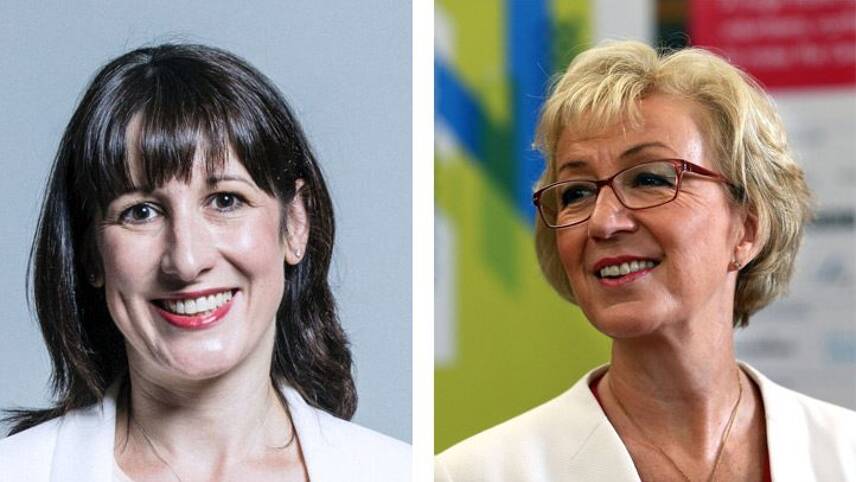Register for free and continue reading
Join our growing army of changemakers and get unlimited access to our premium content

Reeves (L) has made a number of recommendations and asked several scathing questions to Leadsom (R). Images: UK Parliament/ Conservative Party
In a letter penned to Leadsom and publicly published today (29 July), Reeves has called for greater policy support across a number of low-carbon areas of the UK economy, including electric vehicles (EVs), carbon capture and storage (CCS) and onshore wind.
The letter states that the policy gaps which have left the UK off course to meeting its Fourth and Fifth Carbon Budgets have “widened over the past year”, meaning that “urgent action” is now needed to put the UK back on track for an 80% carbon reduction by mid-century – let alone 100% decarbonisation.
On EVs, Reeves has used her letter to re-iterate the BEIS Committee’s recommendation that the ban on the sale of new petrol and diesel cars is brought forward from 2040 to 2032. She is additionally calling for a nationally legislated phase-out of “all but the cleanest” hybrid vehicles.
In the power sector, Reeves’ key recommendation is for stronger policy to support onshore wind. Onshore wind farms are currently blocked from competing for new power contracts under the Contracts for Difference (CfD) auctions, with the Government reportedly having no plans to alter this in light of its new net-zero target. Reeves’ letter grills Leadsom over whether she will review this policy framework, as well as planning restrictions for onshore wind farms.
The letter’s other big ask on power and utilities is for the Government to develop and commission at least three major CCS projects by 2025 – a move which Reeves believes will “minimise the risk of a third major delay to the technology’s development and to ensure that its benefits for productivity accrue to industries across the UK”. BEIS is currently targeting just one large-scale CCS facility by the mid-2020s under its £20m roadmap for the technology.
“With the Government committed to the net-zero target by 2050 but currently set up to fail to deliver on the Fourth and Fifth Carbon Budgets, it is clear the new Secretary of State will need to hit the ground running and act quickly to ramp up efforts on the policies and actions crucial to tackling climate change and capitalising on the opportunities of a low-carbon economy,” Reeves, who was the first to introduce a net-zero bill to Parliament, said.
“The Secretary of State should also seek to overcome Treasury resistance and ensure that her colleague at No.11 examines the potential benefits as well as the costs of the transition to net-zero.”
Reeves’ latter comment comes after former Chancellor of the Exchequer Philip Hammond argued that it would cost the UK economy around £1trn to meet net-zero carbon emissions by 2050, requiring cuts to be made to front-line public services such as schools, police forces and the healthcare sector. The Committee on Climate Change (CCC) has continued to insist that this will not be the case.
Cabinet reshuffle continues
The letter from Reeves comes on the same day that Boris Johnson has finished appointing junior Ministers to BEIS and the Department for Food, the Environment and Rural Affairs (Defra).
Following the appointment of Leadsom and Theresa Villiers to the most senior posts at these departments respectively last week, Johnson has appointed Zac Goldsmith MP as Parliamentary Under Secretary of state at Defra and the Department for International Development (DfID).
Goldsmith, a staunch Brexiteer and former London Mayoral candidate, has a long history of campaigning for biodiversity protection and was last year appointed as London’s Champion against the illegal trade of wildlife.
He takes the position of Parliamentary Under Secretary from Therese Coffey MP, who has been promoted to Minister of State. Coffey has held a ministerial position at Defra since July 2016 and has played a key role in developing the 25-Year Plan for the Environment.
Elsewhere, George Eustice MP was last week given back his former role as Agriculture Minister by Johnson, after leaving the post in February over Brexit concerns.
Sarah George


Please login or Register to leave a comment.